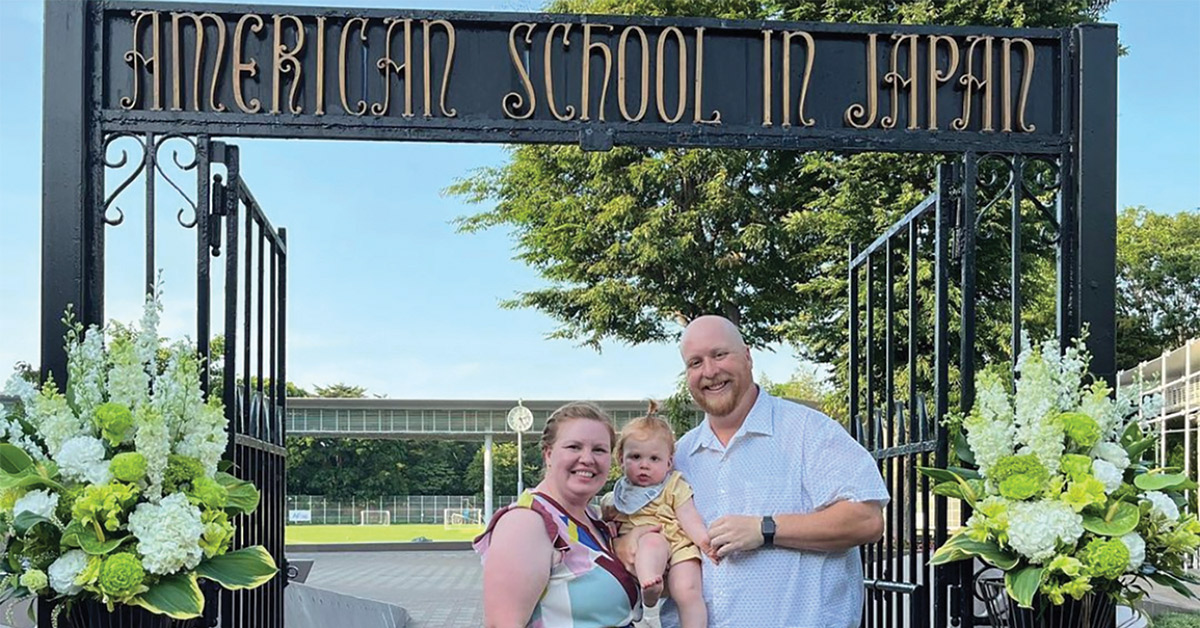
Christine Lundgren-Williams ’12 and Beau Williams ’12 with their daughter Amelia in front of the American School in Japan, where Christine and Beau taught for seven years.
For Christine Lundgren-Williams ’12, studying abroad didn’t satisfy the desire to travel: It ignited it.
Today, Christine lives and teaches in Malaysia with her husband Beau Williams ’12 and their daughter Amelia. The couple agrees that even after eight years, this experience is just the beginning.
A Whole New World
It started through Central College’s opportunities to travel and experience cultures outside the United States. Christine studied in the Netherlands during her time at Central and her return home left her eager for more.
“When I got back from studying abroad, I missed it terribly,” Christine says. “People kept telling me, ‘It’ll get better,’ and ‘You’ll get used to being back.’ That never happened for me.”
Instead, Christine was stuck on a memory of an American school in the Netherlands. With the knowledge that Americans could teach the U.S. curriculum at schools in other countries, Christine had a new mission in mind.
“Christine really had this passion of wanting to go outside the U.S. eventually,” Beau says. “That was always on the radar. Once we started our careers, I worked at Central for a bit and she worked in Pella. Then we decided to make the jump.”
The first step was a recruitment fair in Boston. Christine spoke with a variety of international schools about teaching opportunities and tried to keep an open mind.
“My recruitment coach encouraged me to consider more options since I hadn’t worked overseas,” Christine recalls. “We were willing to consider anywhere in the world.”
A few days later, Christine received a job offer to be a middle school learning support teacher at the American School in Japan.
“We really liked the offerings from Japan,” Christine says. “It seemed like a really good fit for us and it had a great reputation as being one of the top international schools.”
After months of packing, paperwork and preparation, Christine and Beau left Iowa for Japan.
“We had no idea what we were getting into,” Christine laughs. “We probably should have prepared more.”
Beau agreed but thought it was good they didn’t go into the experience with expectations.
Somewhere New
Life in Japan opened their eyes to how cultures differ, but the transition was a challenge when they first arrived.
“It was definitely a culture shock going from Iowa cornfields to not seeing any grass for a bit,” Beau says.
“I had a hard time at first,” Christine agrees. “I felt like I stood out everywhere I went. There was no blending in.”
With time and patience, Christine and Beau found their home in Japan. Originally on a three-year contract, the couple stayed for seven.
“I was hired to be a middle school learning support teacher, which is kind of like special education,” Christine shares. “I did that for four years, and then I switched to teaching math, which is something that I’d been co-teaching, so it wasn’t completely new. I did that for three years.”
Beau’s situation was a little different. As a spouse, his visa outlined strict limitations. To remain within a 28-hour work week, Beau worked as a substitute teacher and coach before transitioning into the assistant athletics director position. He also continued his education online, earning his teaching license, M.S. in sports administration and certification as an international athletics administrator.
“I don’t hesitate to try new things because of my Central education,” Beau says. “My liberal arts background prepared me to interact with different members of a community.”
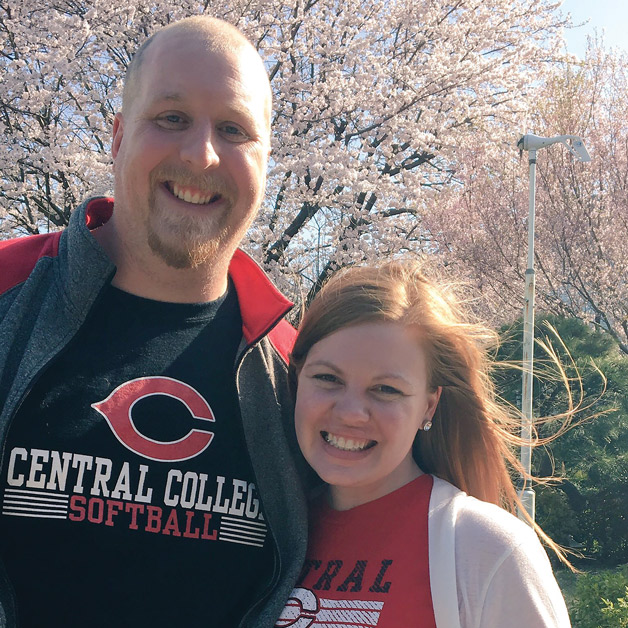
Christine Lundgren-Williams ’12 and Beau Williams ’12 traveled Japan and surrounding countries.
Global Living
The conversations Christine and Beau had with their students, colleagues and friends in Japan opened their eyes to a culture that was new to them. As teachers at an American school, the students were from a variety of backgrounds and locations.
“We’re teaching kids that are also global citizens,” Christine says. “Their worldview is so different from what mine was at their age. I am so appreciative that my daughter will grow up that way, too.”
After seven years of working in classrooms and exploring Japan, Christine and Beau realized that it may be time for another change.
“We planned on being in Japan for four years at the most,” Christine recalls. “After seven, we realized we’d been through a lot there. We wanted to see something different. That’s why we moved to Japan in the first place.”
“We were recruited last year and accepted an offer in Malaysia,” she shares. “We visited Malaysia in 2019 and felt like we could live there, and now we do!”
“We’re in our eighth year overseas,” Christine says. “We don’t plan to move back to the U.S. anytime soon. Our mindset shifted a lot. We like this lifestyle. We like the schools and the friends we’ve made. We want to keep doing it.”
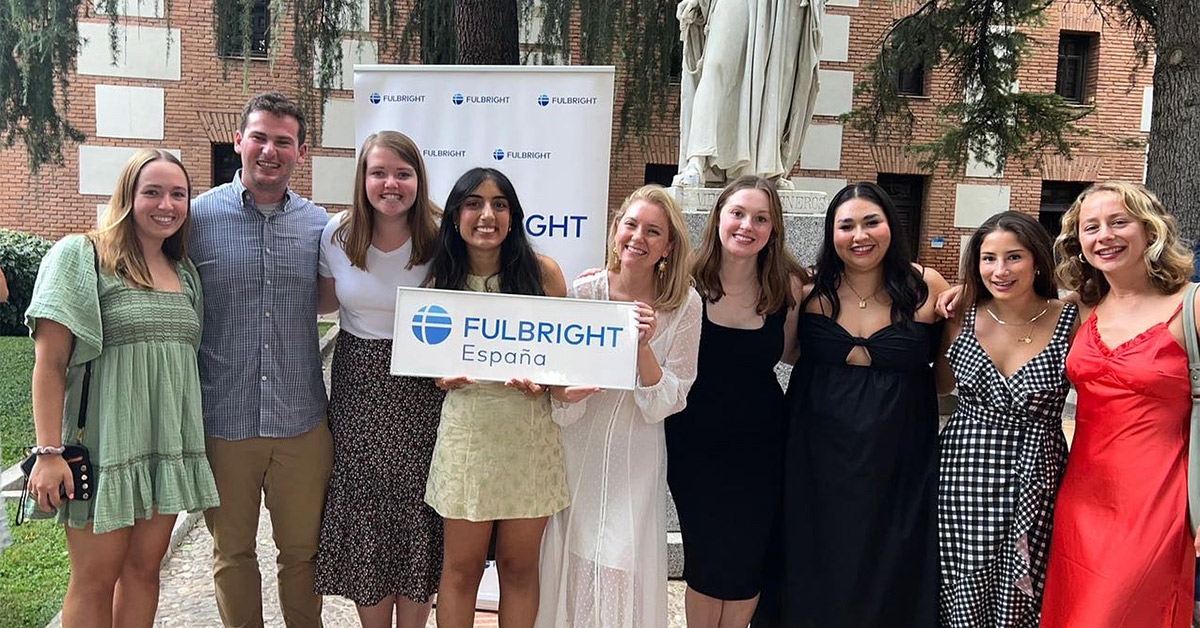
Olivia Svoboda ’22 (third from left) connected with many other Fulbright grantees in Spain.
Lifelong Passion
Seven thousand miles away, an island in Spain became home to Olivia Svoboda ’22. Tenerife is the largest of the Canary Islands, and schools in the area host Fulbright grantees, who teach English to primary school students.
Svoboda started learning Spanish in kindergarten, and her interest in the language and culture only grew from there. After discovering the Fulbright program in her first year at Central, Svoboda knew that teaching in Spain was something she needed to do.
Despite her initial confidence when she began preparing her application, the pressure to submit perfect materials was intimidating. Svoboda had to know exactly where she wanted to go and why, and the materials she had to submit were extensive.
“When you apply, you have to pick one country to apply to,” she says. “They don’t accept people who say they’ll go anywhere. You have to have a reason for why you picked that country and why you’re going there.”
After months of work followed by months of waiting, Svoboda received the news that she had been accepted. Results in hand, it became a race against time to prepare for the adventure of a lifetime.
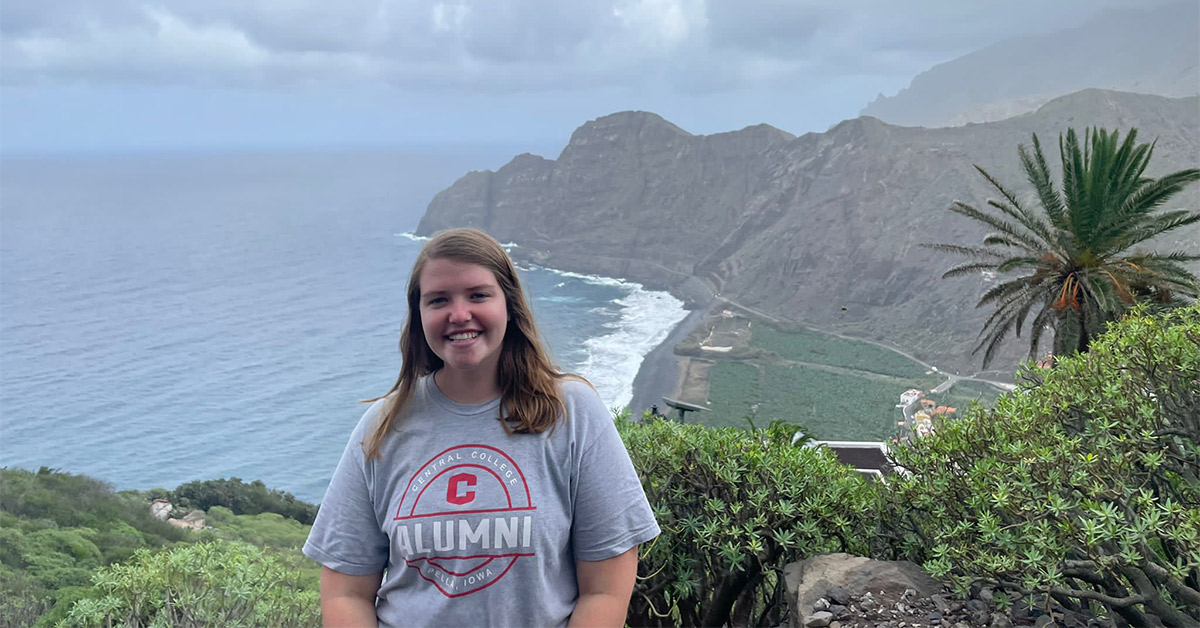
During her time in Spain, Olivia Svoboda ’22 explored the Spanish island Tenerife in addition to nine other countries.
On the Island
A few hundred Fulbright grantees attended orientation in Madrid to connect with others in the program. Orientation lasted a few days, defining what to expect from the cultures and education system. After orientation was complete, Svoboda had another week to get settled before she began teaching.
The week was well spent. Having already obtained an apartment, Svoboda set out to explore where she was stationed. Twelve other participants were stationed on her island and the friendships she made helped her feel more comfortable in the new place.
“There’s a lot lost in the language barrier,” she explains. “It took a lot of patience. But it all fell into place. We had almost a full week when we got there to get those things in place and get accustomed to the island before we started school.”
The connections she made weren’t limited to other Fulbright grantees. The community in Tenerife weren’t native English speakers, but they welcomed Svoboda and the other grantees with open arms.
“My landlord actually drove me around the island,” Svoboda says. “We spent one day at a volcano on the islands. I felt very supported and very at home there.”
“One thing from the Canary Islands that I wish I had everywhere was the community,” she continues. “They cared about each other so deeply and I always felt welcome where I was. That alone was a huge weight off my shoulders to know that I had a community that supported me.”
After some time to explore, Svoboda’s teaching position began. Her role as an English teaching assistant at a primary school was a cultural and professional challenge.
In a school of native Spanish speakers and new ways of teaching, Svoboda had to put trust in those around her and in herself.
“They told the kids at my school that I didn’t know any Spanish,” Svoboda says. “My purpose was to be there speaking English, so they wanted them to only speak English with me.”
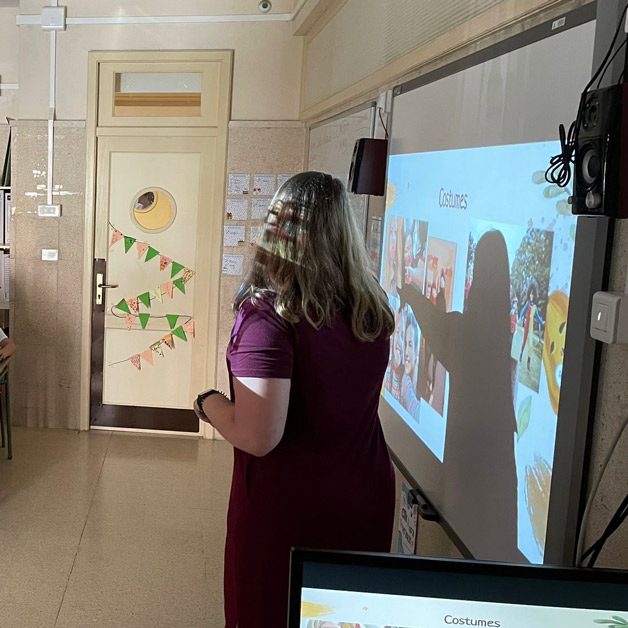
Olivia Svoboda ’22 presents an English lesson in a primary school classroom.
Coming Home
Not all of Svoboda’s time was spent in the classroom. Her teaching schedule provided opportunities to explore.
“Our job there is to be cultural ambassadors, so the number of days we could spend outside of Spain was limited,” Svoboda shares. “That didn’t concern me at all because I went to Spain to be in Spain.”
Svoboda traveled to nine other countries and continued to spend time around Spain, soaking up new experiences. No matter where she traveled to, she was always eager to return to her island.
On more challenging days, Svoboda reminded herself that the nine-month grant was no time at all. When the time to leave came, she realized just how right she was.
“Leaving Tenerife was the hardest part of the whole grant,” Svoboda shares. “Those last few days, preparing to leave, packing up my apartment and saying goodbye to my students and friends was very difficult. I had to keep reminding myself that the goodbye was so hard because of how amazing it was and how much I had to be grateful for.”
From a classroom in Pella, Iowa, to classrooms in Malaysia and beyond, Central alumni continue to go far. Lundgren-Williams and Svoboda are building on their foundation of curiosity and engaged citizenship to explore the world and do good no matter the zip code, time zone or language.
Central provides opportunities for students to discover more about themselves and the world around them. You can help current and future Central students do good in the world by supporting faculty-led trips, mission trips and other off-campus experiences. Visit central.edu/give to show your support today.











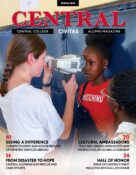
To encourage serious, intellectual discourse on Civitas, please include your first and last name when commenting. Anonymous comments will be removed.